This International Women's Day, we're showcasing six members of our fantastic WEISS community.
We asked six women from our WEISS research community what they are working on, who their greatest female influence is and what advice they would give to other women who want to work in their area of science.
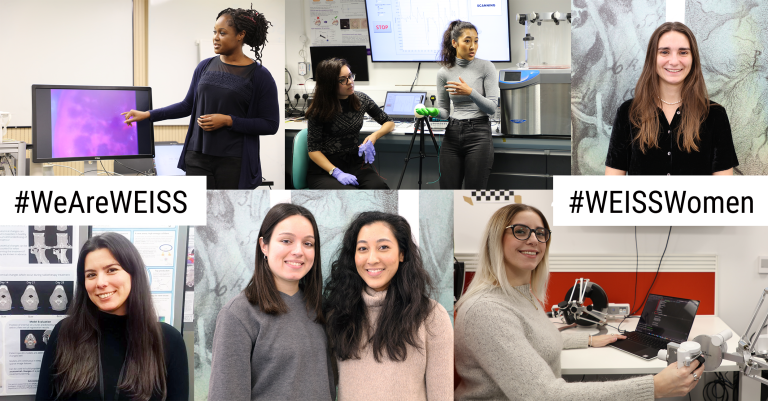
- Athena Reissis, PhD student, Medical Imaging
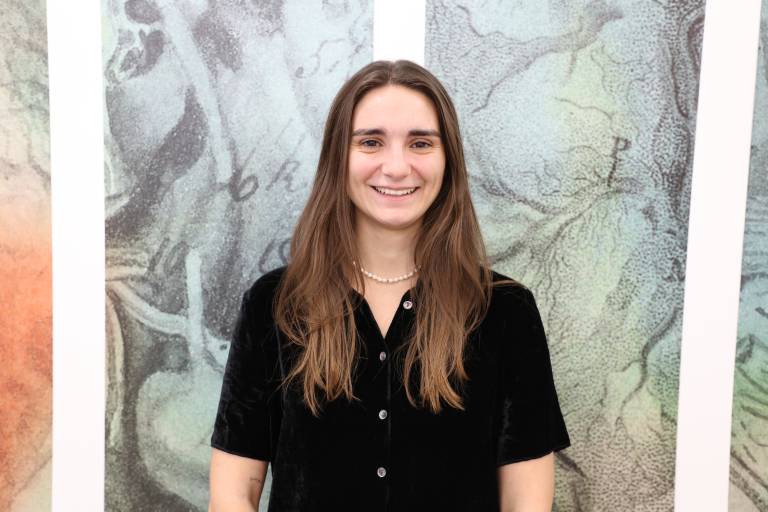
What was the route that you took to get to where you are today?
My journey that has led me to where I am today has been interesting and exciting. I have studied degrees in both Art and Mathematics before going on to work in a range of fields from property, animation, and film/TV. From these roles I found an interest in data and went on to work as a Data Engineer. Within that role I had the ability to experiment with automation developing and ended up really enjoying it so I went on to work for a consulting company as an RPA (Robotics Process Automation) Developer. However my client’s field of work did not interest me and I soon realized the medical/healthcare field was where I wanted to be. AI ties together well with RPA and was something I was interested in to learn more about. So, from these interests, I went on to study a Masters (MSc) at UCL in Medical Robotics and Artificial Intelligence. I loved this greatly, learning about a field I am passionate about and being surrounded by great research and researchers which gave me the drive to continue on and study a PhD in the Medical Imaging field.What are you working on at WEISS?
Studying Craniofacial syndrome (result of an infant's skull or facial bones fusing in an abnormal way) and using machine learning and deep learning to make predictions of how the syndrome will progress over time from post-natal, and potentially fetal images, of the face/head.Which female academic/teacher has been your greatest help/inspiration and why?
I would have to say that my mother has been my greatest help and inspiration. At a later stage in her life, she went on to study a master’s at UCL in a field that she loves and has since, for a number of years, been running the program here herself. She introduced me into the bigger world of academia and showed me that you can always continue doing the things you are passionate about no matter how far down in your career you are. She will go to any lengths to somehow always find time to help others and I would not be able to be where I am today without her support.What advice would you give to other women who want to work in this area?
My advice for any woman who wants to get into the field is to go for it and peruse your passion. Don’t be afraid to put yourself out there, you will always find like-minded people and by networking and getting involved, you will find others who will further inspire you. Also reaching out to other women in the field to act as a mentor to help advise and guide you through any process will always, in any case, be beneficial.- Morenike Magbagbeola, Post Graduate Researcher, Surgical Robot Vision Group
- What was the route that you took to get to where you are today?
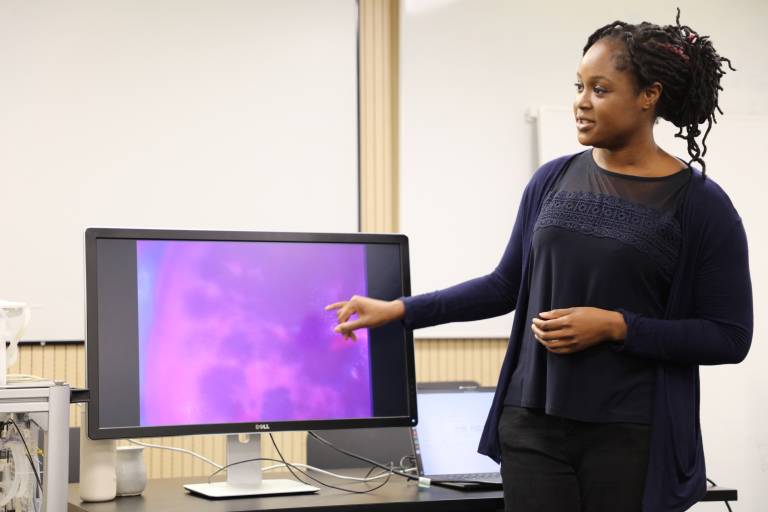
I studied Electrical Engineering and Applied Physics at the University of Washington. I’ve always loved robotics and the bachelor’s course gave me the chance to be part of some amazing projects and conduct research in an undergraduate lab in neurotechnology. After graduating I came to do a MSc in Robotics and Computation at UCL where I stayed to complete a PhD in Adaptive sensory robotics. I have enjoyed academic research, especially in sensorimotor feedback for robotic applications and translational healthcare technology; and so, when the opportunity came to work at the Surgical Robot Vision group, I took the chance.
What are you working on at WEISS?
I currently work on the development of a robotic organ machine platform that aims to keep organs alive autonomously for an extended period of time ex-vivo (outside the body) for research.Which female academic/teacher has been your greatest help/inspiration and why?
I would have to say Dr Anne Vanhoestenberghe who is now a professor at Kings College London. Anne worked as a lecturer at the Aspire CREATe lab during my masters and PhD and her help and kindness throughout both was invaluable. She continues to help me to this day providing advice and support and is an inspiration to more than just me.What advice would you give to other women who want to work in this area?
Make sure you love what you do and have an excellent support network at work. If you have both then the challenges that come are much easier to manage. - Chiara Di Vece, PhD student, Surgical Robot Vision Group
- What was the route that you took to get to where you are today?
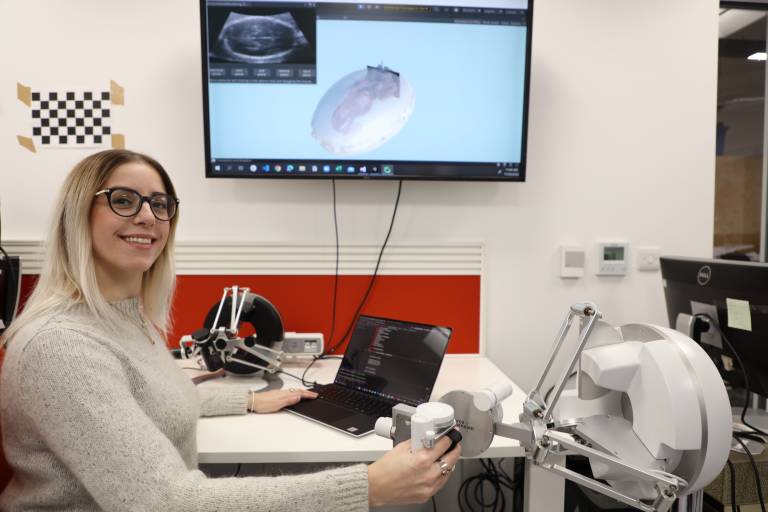
I have been fascinated by scientific subjects from a young age. I decided to study Biomedical Engineering as I wanted to contribute to improving healthcare by combining life sciences techniques with Computer Science and Engineering. Towards the end of my academic studies, artificial intelligence-related courses were crucial in realising the career path I wanted to pursue. My ever-growing passion for research pushed me to start a research internship at Politecnico di Milano, where I focused on an application to guide a needle in reaching the tumour inside the brain. After the internship, I was sure that I loved being a researcher and that this was the career I wanted to pursue. For this reason, I started a PhD in Computer Science at University College London with the Surgical Robot Vision research group.
What are you working on at WEISS?
To become a skilled sonographer, one must get a lot of "transducer time" under the guidance of an experienced sonographer. Recent articles have highlighted a long-term shortage of qualified sonographers in the UK, compounded by increasing demand for ultrasound and radiography services. Hence, a contributing factor to this shortage is the lack of clinical education sites with skilled clinical instructors. To address this issue, we're developing a system to teach inexperienced sonographers to acquire fetal scans using an autonomous guidance system on a silicon phantom of the maternal belly. In this way, the supervision of the experienced sonographer during the entire training process is no longer strictly required, and artificial intelligence will teach the sonographer how to do the job!
Which female academic/teacher has been your greatest help/inspiration and why?
Throughout my life, I've been lucky enough to be surrounded by fantastic women who have always worked incredibly hard to achieve their goals, and I'm highly thankful to all of them. However, if I need to choose, there is one woman who has been a great source of inspiration for me over the past 10 years, Professor Donatella Sciuto, a renowned computer engineering professor at Politecnico di Milano who has made significant contributions to the field of computer science. She currently serves as Rector of the Politecnico di Milano, making her the first woman to hold this position in the university's history. She has always played an active role in promoting and supporting women in STEM fields. She has served as a mentor to many female students and researchers and has advocated for increased opportunities and recognition for women in computer science. I'm sure that her leadership and vision for the future will undoubtedly have a positive impact on the university and the wider community.
What advice would you give to other women who want to work in this area?
My dad gave me a note with this quote a couple of years ago that really stuck with me.
"Whatever dream or wish you hold in your heart, I hope you go for it, brave girl. I hope you believe in yourself with your entire being - and that in those moments that you might not, I hope you pretend until you do believe again. I hope you never settle when it comes to your dreams - I hope that you always chase them with wild lust and fiery passion. I hope you never let the doubters and nonbelievers stop you, and that you let the obstacles strengthen and humble you. Brave girl, I hope you go for your dreams because they are yours to have."
If science or engineering drives and motivates you, then go for it! This field can be challenging, but I can tell you from personal experience that it is incredibly rewarding. There is something special about the feeling of solving a complex problem or creating something new that has never existed before. And you can do that! Find a topic that interests you and enjoy the process of learning and discovering more about it, don't let anyone tell you otherwise. - Poppy Nikou, PhD student, Radiotherapy Image Computer Group
- What was the route that you took to get to where you are today?
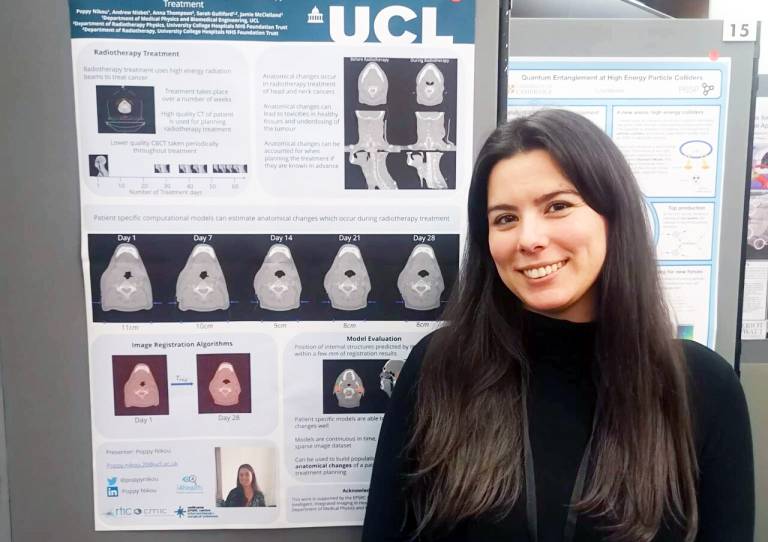
At school I always really enjoyed maths and physics, so I went on to study an integrated master’s in physics at the University of Manchester. During the time of my degree, the first NHS proton beam therapy centre in the UK was commissioned in Manchester. This was exciting and so I did my masters project at this centre. So, when I learned that the next centre would open in London, I looked for opportunities to work with the new team here. This is how I ended up starting my PhD project in ‘anatomical uncertainties in proton beam therapy’.
What are you working on at WEISS?
During radiotherapy, patients are imaged using medical images. My research uses these medical images to model the anatomical changes which are seen in head and neck cancer patients during their radiotherapy treatment. The aim is to anticipate the changes in advance, which will allow us to incorporate that information into their treatment plan.
Which female academic/teacher has been your greatest help/inspiration and why?
My mum is a primary school teacher and will always be my greatest help and inspiration. She always encourages me to see the greater picture and have confidence in myself even when I don’t.
What advice would you give to other women who want to work in this area?
Go for it! - Carmen Salvadores Fernandez, PhD student, Nanoengineered Systems Lab
- What was the route that you took to get to where you are today?
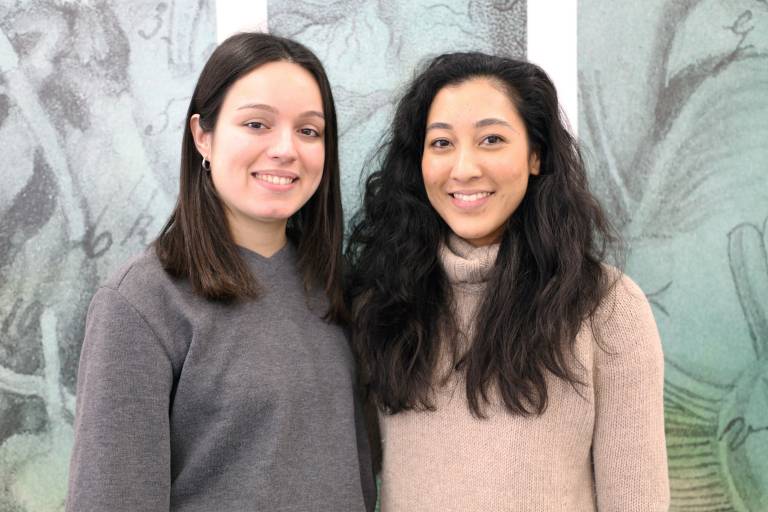
When I was 18, I left my city in Spain (Leon) to come and study Mechanical Engineering at UCL. At first, I did not know what to expect nor if I would enjoy this particular degree, I just knew I was very curious and interested in learning about the mechanism and reasoning behind of all kinds of things. I loved the degree, my first years in London, and the amazing relationships I built, so I decided to pursue my studies and have been doing my PhD for the last 3/4 years.
What are you working on at WEISS?
I am working on tactile sensors for healthcare applications. More specifically, I am trying to mount sensors on the fingertips of surgical gloves to aid clinicians during different kinds of procedures, by giving them objective information that could help improve their safety and training.
Which female academic/teacher has been your greatest help/inspiration and why?
Shireen Jaufuraully – I have been working really closely with her for the last almost 3 years. I can’t even imagine what it would have been like without her. Shireen always makes everyone around her feel understood, listened to, and valued. Every single day she brings really powerful, passionate energy along with her, and this helps both of us push the project as much as we can, while enjoying every step of the way. She always motivates me and inspires me, she has shown me how to feel fulfilled and happy with what we are doing day after day, always being honest and true to her values.
What advice would you give to other women who want to work in this area?
As my supervisor has told me on multiple occasions, resilience is something very important in life. I don’t think I completely understood this until quite recently. One of the things I value the most of my PhD has been learning to be more resilient. No matter what happens, in life we need to keep going and keep working towards our dreams and towards creating a positive impact as much as we can and in every aspect, we touch along the way. Sometimes, it takes a long time to see the results of our work/effort, but this does not mean that it is inexistant. We need to always move forward and enjoy as much as we can along the way.
Why do you think you and Shireen work so well together?
We have both become good friends. Not only do we work well as a team, feeding on each other’s passion and hard work ethic (and especially resilience – problem shared is problem halved), but also, we enjoy each other’s company and value each other as friends. Furthermore, the fact that we are both from completely different backgrounds – medical and engineering (thanks to the WEISS Centre we are able to collaborate so closely), allows us to be creative and innovative in our joint problem solving and development of the work. - Shireen Jaufuraully, Clinical Research Fellow (Obstetrics) and PhD student
- What was the route that you took to get to where you are today?
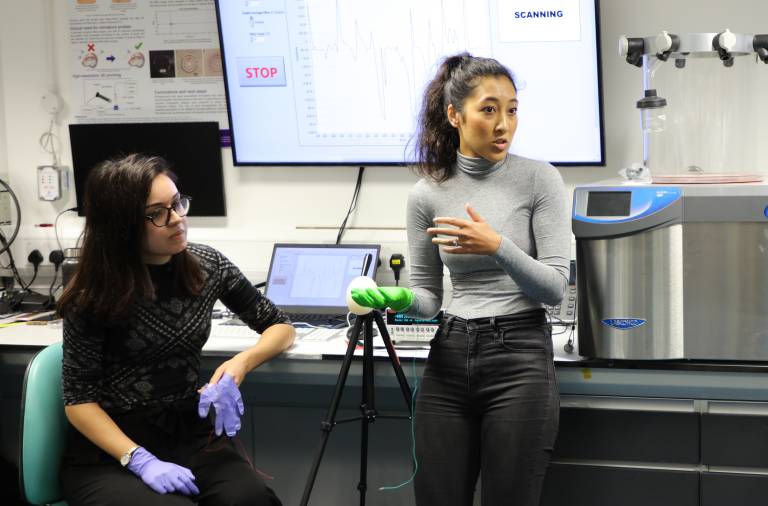
I’ve always been interested in research and how to improve Women’s Health. I graduated from medical school in 2014 and started specialty training in obstetrics and gynecology in 2016. I wanted to become more involved in research because I realised how important it is to practice evidence-based medicine, and how it can improve women’s lives for the better.
What are you working on at WEISS?
We are working on a glove with special sensors on its fingertips. These sensors have been able to detect which way the baby is looking using models of the baby’s head, which we hope will make instrumental birth (ventouse or forceps) safer, as we can place our instruments more accurately. The glove can also detect anal sphincter injury in pig models, which, when translated into clinical practice, we hope will be able to aid diagnosis of anal sphincter tears after childbirth. If undiagnosed, these can have a negative impact upon quality of life, with debilitating symptoms. The glove therefore has the potential to change birth outcomes for the better.
Which female academic/teacher has been your greatest help/inspiration and why?
At university, I undertook an intercalated degree in Women’s Health at King’s College and was lucky enough to be supervised by Prof Lucy Chappell. As a young medical student with little experience of research, she really opened my eyes to how research could change patient outcomes for the better, and how important evidence-based medicine is. She continues to inspire me to this day.
What advice would you give to other women who want to work in this area?
My dad has always told me to keep my head down and work hard, and not to compare myself to others. It’s inevitable and natural to do so, but I strongly believe that your achievements and actions speak for themselves. At school, I vividly remember past teachers telling me that I shouldn’t pursue a career in medicine because, in their minds, my personality didn’t fit the ‘typical’ mould of what a doctor and woman in science should be. Thank goodness I didn’t listen to them! Never let anyone tell you that you can’t do something. At the end of your career, you don’t want to be thinking to yourself ‘what if’.
Why do you think you and Carmen work so well together?
It’s been an absolute pleasure to work with Carmen over the last 2.5 years. Without her, we would not have been able to progress our work on the sensor glove. We have a mutual respect for one another, and our different skillsets/experiences have enabled us to work towards a common goal. We have always communicated openly and supported each other. It’s also really important that we get on very well on a personal level. Not only have I gained an excellent colleague, but a friend for life.
 Close
Close

